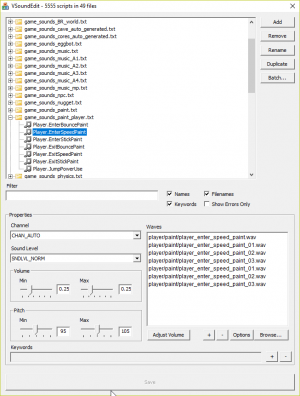VSoundEdit: Difference between revisions
m (how do i) |
(Added some information about the tool not starting up with a way to fix that, and mentioned that it can be made to work with other Source games. Also added syntax.) |
||
| Line 1: | Line 1: | ||
[[Image:VSoundEdit.png|thumb|300px|VSoundEdit in action.]] | [[Image:VSoundEdit.png|thumb|300px|VSoundEdit in action.]] | ||
'''VSoundEdit''' is a tool used by Valve to edit [[soundscripts]], particularly in mass. It provides a user-friendly GUI to batch creation, and also supports editing individual soundscripts with a simple and comprehensive interface. {{Note|For all of its advanced features, it does <i>not</i> support playing back the soundscript!}} | '''VSoundEdit''' is a tool used by Valve to edit [[soundscripts]], particularly in mass. It provides a user-friendly GUI to batch creation, and also supports editing individual soundscripts with a simple and comprehensive interface. It supports [[Dino D-Day]], {{portal2}} [[Portal 2]], and can be made to support many other Source games, including Source 2013. | ||
{{Note|For all of its advanced features, it does <i>not</i> support playing back the soundscript!}} | |||
=== Syntax === | |||
vsoundedit [options] | |||
Options: | |||
;<code>-game</code> | |||
:Overrides the [[VProject]]. Needed if you want to use it for other Source games that don't have it. | |||
== History == | == History == | ||
VSoundEdit was used extensively in the development of [[Portal 2]], being used to batch create sound entries from large numbers of WAV files. However, like many of the tools used in Portal 2's development, it was never shipped. The tool can be found in [[Dino D-Day]], among many other unreleased tools. | VSoundEdit was used extensively in the development of [[Portal 2]], being used to batch create sound entries from large numbers of WAV files. However, like many of the tools used in Portal 2's development, it was never shipped. The tool can be found in [[Dino D-Day]], among many other unreleased tools. | ||
== Not starting up == | |||
VSoundEdit will silently close if it doesn't find any soundscript files. In order for it to find them, you must have at least one searthpath in [[GameInfo.txt]] that directly leads to them, in most cases, this searchpath should be sufficient: | |||
Game |Gameinfo_path|. | |||
This will search the folder where GameInfo.txt is for soundscripts in the scripts folder. Remember that the first part <code>Game</code> should always be by itself. In other words, don't do this: | |||
Game+Mod |Gameinfo_path|. | |||
This will cause the searchpath to be ignored, due to the outdated engine searchpathing it's based on. If you however, need to do this, then you can add the first example below it. | |||
== See also == | == See also == | ||
Revision as of 22:51, 11 July 2018
VSoundEdit is a tool used by Valve to edit soundscripts, particularly in mass. It provides a user-friendly GUI to batch creation, and also supports editing individual soundscripts with a simple and comprehensive interface. It supports Dino D-Day, ![]() Portal 2, and can be made to support many other Source games, including Source 2013.
Portal 2, and can be made to support many other Source games, including Source 2013.
Syntax
vsoundedit [options]
Options:
-game- Overrides the VProject. Needed if you want to use it for other Source games that don't have it.
History
VSoundEdit was used extensively in the development of Portal 2, being used to batch create sound entries from large numbers of WAV files. However, like many of the tools used in Portal 2's development, it was never shipped. The tool can be found in Dino D-Day, among many other unreleased tools.
Not starting up
VSoundEdit will silently close if it doesn't find any soundscript files. In order for it to find them, you must have at least one searthpath in GameInfo.txt that directly leads to them, in most cases, this searchpath should be sufficient:
Game |Gameinfo_path|.
This will search the folder where GameInfo.txt is for soundscripts in the scripts folder. Remember that the first part Game should always be by itself. In other words, don't do this:
Game+Mod |Gameinfo_path|.
This will cause the searchpath to be ignored, due to the outdated engine searchpathing it's based on. If you however, need to do this, then you can add the first example below it.
See also
| |||||||||||||||||||||||||||||
